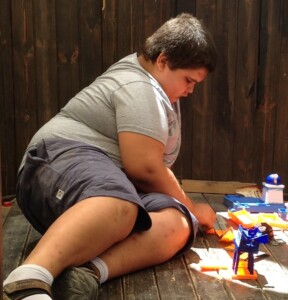I’m slugging below the belt here in that it infuriates me that so many parents allow their autistic kids to get fat; I don’t mean thick, but obese.
Every time I go to an autism function, I see fat autistic young adults and significantly overweight autistic children.
Since about 42% of Americans are obese, you might be thinking, “Well of course there are fat autistic kids and young adults at any event where there’s crowds of people.”
However, the rate of obesity in people with Autism Spectrum Disorder is much higher than in neurotypicals.
In one study involving a large clinical sample of autistic children and young adults (6,672 subjects ages two to 20), it was concluded that “Children with autism and Asperger syndrome [autism] had significantly higher odds of overweight and obesity than control subjects.”
Another report states that “there are currently no recommendations or guidelines specifically geared toward nutrition and physical activity for those with intellectual and developmental disabilities [autism is a developmental disability].”
How about this: Parents put their foot down and LEARN TO SAY NO.
I have a late clinical diagnosis of Autism Spectrum Disorder.
I have many recollections in childhood where I wanted to eat something sugary, and my mother simply said “No.”
For instance, we’d be in the checkout at the grocery store. I’d ask if I could have a particular candy item. She’d say no.
My mother was more concerned about protecting my body from obesity, and protecting my teeth from cavities, than in gaining brownie points by giving in to all my whims.
I was allowed only one Twinkie or other Hostess product per day. I was trained to ask permission for a second Ho-Ho.

Christian Cable/Canterbury, UK/creativecommons.org
My siblings and I were allowed only one candy bar a day from our Halloween stash.
There were times, though, where I got away with feasting on chocolate candy, such as at my paternal aunt’s house every New Year.
But my mother would never do what this aunt did: set out multiple bowls of chocolates throughout the house.
One day my maternal grandmother, who was visiting from out of state, wanted to buy me an entire bag of miniature candy bars.
My mother found out and forbade it.
When my mother would buy a can of Hershey’s chocolate syrup, she’d point to it and say, “This should last an entire week.”
My mother was a great cook, and we often had steak and homemade mashed potatoes for dinner.
There was always dessert — which I could have, even though she knew I’d also had a Hostess product with lunch.
So then, just one Hostess cupcake with my egg salad sandwich at lunch, and one piece of cake after dinner. I had a great sweet tooth that my mother refused to submit to.
Her fried chicken and Lebanese cooking were legendary. Her bread recipe could launch a thousand ships.
But overconsumption of items such as cake, cookies, ice cream, chocolate milk, candy, donuts, etc., was not permitted.
Whatever mental issues I ended up having in adulthood, I guarantee you, were NOT caused by having restrictions on sugary food during my childhood.
My mother never mentioned body image, beauty standards, “the ideal body,” or any of that other mumbo jumbo that’s wall-to-wall on TikTok and Instagram.
She was a woman of rules and practicality — and I believe she was on the Spectrum, too. She didn’t want fat kids with bad teeth.
Today’s deranged fat activists would call my mother abusive, and they’d label her as fatphobic – a catch-term of delusion and make-believe.
We actually should ask ourselves how a mom – and dad or other primary caretaker – in their right mind, could allow their child to become fat, especially morbidly obese (according to a pediatrician’s assessment).
At a World Autism Day event, I saw an autistic girl – visibly in her mid-teens or possibly early 20s – who was literally stuffing herself with food – brought to her by her obese mother.
While thinner autistic kids and young adults were up and about, trying different activities, this young woman – who appeared to be 5’3 and 250 pounds – remained slouched in her seat, eating.
It was super easy to be aware of this, as my chosen table was nearby, and I repeatedly left it to make my rounds at the event.
Every time I left, and every time I returned, the poor girl was in the same spot, usually with a new plate of food before her — a prisoner in her body, thanks to her mother, while other autistic teens and young adults were mobile enough to enjoy all the attractions.
You might be assuming that the harried parents of autistic kids with significant impairments (high support needs) have no choice but to use food to calm them.
Or perhaps these parents feel so bad about their child’s condition that they take the quick and easy route to making them happy in the moment: give them all the food they want.
It’s very possible that the young woman may have thrown a tantrum if her mother had put the brakes on the food intake.
But if that’s the case, ask yourself how the girl ever learned that kind of behavior in the first place, and what keeps that kind of behavior coming. What maintains it? The reward: food!
- But it’s not fair to assume that every fat autistic kid would have a tantrum if not given all the food they want.
- To go in this direction would be to stereotype all autistic kids as being prone to manipulative behavior.
Nevertheless, autistic kids can learn maladaptive behavior, to get what they want, as much as neurotypical kids can.

I took this shot at a major autism fair (not the event discussed previously). The autistic boy appeared about four or five; his mother (whose short stature makes the boy appear older in this image) was struggling to control her son’s outburst, including with a strap-like leash around the boy’s waist. She made several attempts to get him to his feet when he was on the ground — attempts that proved difficult due to his weight. Because this image shows him from behind, the full extent of his abdominal girth is not obvious. There is just NO excuse for allowing a child this young to get this fat — autistic or not.
I knew, growing up, that no tantrum in the world would’ve gotten me half a box of Twinkies or three Quarter Pounders. My parents, especially my mother, never stood for tantrums.
When I was around six, I had what was probably a meltdown during a fireworks show.
My mother let me bawl in her lap, while her big purse was over my head. This was how she soothed me. It wasn’t a tantrum; it was a response to sensory overload.
But a tantrum to get more junk food? Only when frogs fly!
We also can’t assume that every lenient parent who allows their obese autistic (or NT) child “food freedom” does so to prevent that child from yelling or becoming explosive.
Sometimes, these parents think it’s a show of love to overfeed their child, even as the child balloons up before them.
My mother loved me as much as any of these lenient parents love their own kids.
And one way she showed her love was to ensure that I didn’t get fat, so that I could be healthy and be able to play with boundless energy, and so that I wouldn’t grow up physically slow, lumbering and aching from gravity working against excess body weight.

No matter how you slice it, there just is NO excuse for letting your autistic child get fat!
Some Questions for Parents of Autistic Kids
- Who controls the food coming into the house?
- Who buys the food?
- Who’s in charge?
- Who’s supposed to be in charge?
One of the greatest things a parent can do for their child is not let them get fat and to encourage plenty of physical activity.
Obesity is strongly associated with cognitive decline in later adult life.
In someone on the Autism Spectrum, any cognitive decline would be especially daunting.
The obesity cognitive impairment connection is well-established.
But there’s something else we must consider: And that is self-worth.
Self-Worth in Autistic Kids, Teens and Adults
Though an autistic child may not care how their appearance and hindered mobility, due to excess weight, impacts how much they are accepted socially by their peers – the fact remains that there’s something about having a fit, normal-weight, highly mobile body that tremendously benefits self-worth and self-confidence.
Who’s better off mentally? The fat autistic adolescent who can’t run well and gets tired easily?
Or the one who can run like the wind, leap around and play without tiring out?
Many of the obese or morbidly obese autistic people I’ve encountered are highly verbal and interactive.
I’m saying this so that readers don’t automatically assume that most very overweight autistic kids, teens and adults are “low functioning,” or, to put it another way, have highly substantial support needs.
Many Level 1 Autistics Are Morbidly Obese
And besides, whether the autism is Level 1, 2 or 3 – or minimal support needs, substantial support or very significant support – at the end of the day, it is the PARENT WHO CONTROLS THE FOOD SUPPLY AND ACCESS!
You can’t tell me that an autistic child, who never goes into the community by himself or herself, who does not have any more money than what their parents give them, who does not drive a car and maybe doesn’t even ride a bicycle, can just up and magically obtain large quantities of food.
The food comes from the parents giving it to them, like the mom at the autism event, bringing her daughter one plate after another of Italian food!
Sure, there are times when that sorrowfully overweight child may be overfed by a grandparent, aunt or neighbor, but if the food intake is monitored at home by the parents, those occasional episodes of overeating at Aunt Rose’s house or at Suzie’s birthday party shouldn’t lead to obesity.
• Autism does not cause impairment in the brain’s ability to detect when the stomach is full of food; autism does not cause insatiable hunger.
• Autism does not cause a super slow metabolism.
• Don’t blame dyspraxia or uncoordinated movements for significant overweight.
• Obesity is primarily driven by overconsumption of food, not the being unable to walk in a straight line, catch a ball, jump on a trampoline or crawl through a toy tunnel.
• However, a sedentary lifestyle (hours of screen time daily) encourages overeating!
If morbid obesity tanks the self-confidence and the self-worth of neurotypicals, imagine how negatively impacting it must be on an autistic person.
Significant overweight can be felt every time that individual gets up and walks.
There are constant reminders – when they sit, when they rise from a chair, when they get in and out of a car or go up a few steps, let alone a staircase.
It’s not a pretty way to exist, no matter what the “fat liberation” influencers on TikTok and Instagram say.
NOTE: I’m not saying that a physically fit body at a medically desirable weight will cure troublesome autism traits. So don’t even go there.
BUT – doesn’t it stand to reason that when an Autist must carry around a significant load of excess body weight, this will really dampen their self-confidence – whether they realize it or not?
Though I haven’t seen autistic kids or young adults using a cane or walker to take some gravity off of their heavy bodies, I have clearly observed that the weight has disrupted their gait and posture – the way it typically does with obese people in the NT population.
And don’t forget that morbid obesity in young people will start mercilessly catching up to them, in terms of mobility and health issues, as they approach 40, even sooner.
It’s Not Genetic
It’s also not surprising that whenever I see a fat autistic child or young adult, at least one parent is usually morbidly obese.
Look at photos of crowded venues dating back many decades. Fat people are noticeably in the minority, not the 42% we see today.
Obesity should not be normalized, especially in those on the Autism Spectrum.
There are autistic influencers on TikTok and Instagram who promote obesity and fat activism.
Their rhetoric is just as dangerous to impressionable minds as was the pro-ana (anorexia nervosa) movement that promoted tricks and techniques to get as underweight as possible.
The human body was not meant to have rolls of fat hanging off of it.
Poverty doesn’t cause obesity; overconsumption does. Lands that are affected by true poverty have an exceedingly low incidence of obesity.
 Lorra Garrick has been covering medical and fitness topics for many years, having written thousands of articles for print magazines and websites, including as a ghostwriter. She’s also a former ACE-certified personal trainer. In 2022 she received a diagnosis of Level 1 Autism Spectrum Disorder.
Lorra Garrick has been covering medical and fitness topics for many years, having written thousands of articles for print magazines and websites, including as a ghostwriter. She’s also a former ACE-certified personal trainer. In 2022 she received a diagnosis of Level 1 Autism Spectrum Disorder.
.



























